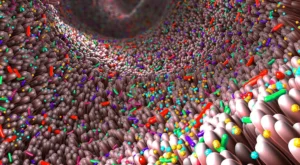Scientists have performed study after study on probiotics to determine their effect on various body systems. The results are promising, and continued research focuses on how particular strains of probiotics impact different body systems such as the gut, skin, brain, urinary system, heart, and more.
Fiber has been another area of study for years. Doctors, dieticians, and researchers continually stress its positive impact on intestinal health. Does adding fiber to the diet help or hinder the positive effects of probiotics? Read on to explore the relationship between fiber and probiotic supplementation.
Understanding Fiber
There are two types of fiber in our foods: soluble and insoluble. Our bodies cannot break down either one, and that’s good. We need them in our digestive system because they help create softer, bulkier, and more regular stools and, scientists believe, help avoid some chronic health conditions.
Soluble Fiber
When taken with fluids, soluble fiber dissolves and forms a gel which feeds healthy bacteria in the colon. The gel can also reduce the fat you absorb and help with the body’s overall health.
Insoluble Fiber
Insoluble fiber is also indigestible, but instead of dissolving, it remains intact as it reaches the colon. It absorbs fluids, attaches to other materials, and becomes part of a healthy stool. It can help with regularity and bowel health.
Probiotics and Fiber
Probiotics thrive on certain types of fiber called prebiotics. When these reach the intestines, the probiotics consume them, producing the postbiotic substances that are so helpful for the human body.
Fiber-Rich Foods
You can add insoluble fiber into your diet by consuming beans, nuts, whole wheat flour, and vegetables. Sources of soluble fiber include – oats, citrus fruits, carrots, beans, barley, apples and psyllium.
The Benefits of Probiotics
Probiotics are helpful microorganisms that live in our digestive tract and all over our bodies, with the largest number in the gut. They consist of bacteria, fungi, and viruses. Their activities confer health benefits, creating specific vitamins, fatty acids, and other substances vital to human health.
Studies indicate that these organisms help strengthen the immune system, reduce inflammation, and communicate with other body systems. The most common bacteria provided in fermented foods, probiotic-enhanced foods, and supplements are various strains of Lactobacillus and Bifidobacterium. They are also the most studied bacteria.
Combining Fiber and Probiotics
Doctors have long recommended fiber for intestinal and general health, but it is also essential for human biome health. Probiotics need prebiotic fiber to live and produce the vital nutrients they naturally create.
Introducing probiotics with fiber and a healthy diet containing plenty of prebiotic fiber begins the process of restoring the microbiome to balance.
Drawbacks of Fiber and Probiotics
Adding too much fiber to your diet too quickly can cause unwanted symptoms, such as bloating, flatulence, constipation, abdominal pain, and temporary weight gain. To prevent this, add fiber to your diet gradually. If you experience these symptoms during this process, reduce fiber, drink plenty of water, and increase physical activity.
After your symptoms decrease, reintroduce fiber in smaller amounts throughout the day. Experts recommend 38g of fiber for men and 25 g for women younger than 50. For those over 50, the recommendation is 30g for men and 21g for women.
See your doctor if you experience nausea, vomiting, a high fever, or an inability to pass a stool.
Choosing the Right Fiber Probiotic Supplement
Selecting the best probiotic and fiber supplement can be confusing because there are so many to choose from. Keep a few things in mind:
- Choose a supplement that contains prebiotics.
- Select a supplement with multiple probiotic strains for optimal gut biome diversity.
- Read labels to ensure the product contains no chemicals, additives, colorants, or allergens.
- If you find ingredients listed on the label you don’t recognize, move on.
- Look for whole food ingredients. Dr. Ohhira’s probiotic supplements are cultured for three years in large vats, and the bacteria are fed whole, natural ingredients with prebiotics to multiply and gain strength.
Incorporating Fiber Probiotic Supplements into Your Diet
You can take a prebiotic supplement along with a probiotic supplement or choose a combined supplement. Either way, the best time to take it is when you will do it regularly. It is optimal to take a probiotic 30 minutes before breakfast to give it a chance to get into your system when your stomach is empty.
Most people experience little or no discomfort when taking a fiber probiotic supplement. Some people report temporary gas and bloating, which should disappear after a couple of weeks. If they continue, it’s best to discontinue the supplement and see your doctor.
If you’ve had a recent surgery or hospitalization or have a chronic condition, it is best to consult your doctor before taking a probiotic supplement.
FAQs about Probiotic Fiber Supplements
Is it good to take fiber and probiotics together?
Yes. Certain kinds of fiber, called prebiotics, support probiotics and gut health.
What does a probiotic fiber supplement do?
It contains prebiotics, the fiber that probiotics need to live. When both enter the digestive tract, the probiotics have a ready food source, giving them a head start on survival.
What is a prebiotic fiber supplement?
A prebiotic fiber supplement contains the fiber probiotics prefer, so it feeds the probiotics in your system.
Which is better, fiber or probiotics?
Our bodies need fiber to promote healthy bowel activity and support our microbiome. We also need probiotics to create essential nutrients and balance microbial health.
A Few Final Thoughts About Probiotic Fiber Supplements
Talk to your doctor about a fiber and probiotic supplement. Most doctors consider probiotics and fiber generally safe for human consumption. Taking a probiotic fiber supplement gives you two essential nutrients in one. Dr. Ohhira’s probiotics contain thirteen probiotic strains and prebiotic fiber to promote the greatest bacteria survival and gut microbial diversity.
You can order online or contact us for more information.




